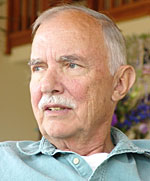Lewis M. Branscomb - Professional Biography
Lewis M. Branscomb passed away on May 31, 2023. At the time of his passing he was Aetna Professor of Public Policy and Corporate Management (emeritus) in Harvard University's John F. Kennedy School of Government. Until July 1996, he directed the school's Science, Technology, and Public Policy Program in the Belfer Center for Science and International Affairs. He most recently held three appointments at the University of California at San Diego: Adjunct Professor in the School for International Relations and Pacific Studies (IRPS); Research Associate in the Scripps Institution of Oceanography (SIO), and Distinguished Senior Fellow in the U.C. Institute for Global Conflct and Cooperation. His most recent research focused on domestic and international research and innovation policy, information infrastructure, policies to make the world safer and more secure from disasters, and on the management of science and technology in the furtherance of democratic governance, economic equity and safety and security.
Dr. Branscomb was graduated BA in physics from Duke University summa cum laude in 1945. He served as a junior officer in the US Naval Reserve in the Philippines during World War II. He received his PhD in physics from Harvard in 1949, when he was appointed Junior Fellow in the Harvard Society of Fellows. A research physicist at the U.S. National Bureau of Standards (NBS, now the National Institute for Standards and Technology) from 1951 to 1972, he, with Stephen J. Smith, founded the crossed-beam study of structure and spectra of atomic and molecular negative ions, and applied this knowledge to chemical aeronomy, stellar atmospheres and ionized hypersonic wakes. He served as Editor of the Reviews of Modern Physics from 1963-1969 and was President of the American Physical Society in 1979.
He was the first Chairman of the Joint Institute for Laboratory Astrophysics (JILA) in Boulder, CO. He was appointed Director of NBS by President Nixon in 1969. In 1972 he was named vice president and chief scientist of IBM Corporation and later a member of the IBM Corporate Management Board. In 1980 President Carter appointed him to the National Science Board and in 1980 he was elected chairman serving until May 1984. In 2012 he helped found the Center for Science (UCS)and Democracy in the Union of Concerned Scientists, and serves on the Steering Committee of the CSD.
Branscomb was appointed by President Johnson to the President's Science Advisory Committee (1964-1968) and by President Reagan to the National Productivity Advisory Committee. He served as a member of the National Academy of Engineering, the National Academy of Sciences, the National Academy of Medicine and the National Academy of Public Administration. He served on the Technology Assessment Advisory Committee to the Technology Assessment Board of the United States Congress, and in 1991 was appointed to the Massachusetts Governor's Council on Economic Growth and Technology.
He holds honorary doctorates from fifteen universities. He has served as a director of four corporations (Mobil, General Foods, MITRE, and Draper Laboratories) still serves as a director of Lord Corporation in Cary, NC. For a continuous period of 57 years he and/or his father B. Harvie Branscomb served as trustees of Vanderbilt University. He has been a trustee of Woods Hole Oceanographic Institution, and the National Geographic Society. From 1984 to 1986 was an Overseer of Harvard University. In December, 1998, he was awarded the Okawa Prize "for outstanding contributions to the progress of informatics, scientific and technological policy and corporate management."
Prof. Branscomb has written extensively on information technology, comparative science and technology policy, and management of technology. His books (available for loan in digital form from the Internet Archive (archive.org) are:
- Confessions of a Technophile (1994), Beyond Spinoff: Military and Commercial Technologies in a Changing World, (with J. Alic, et.al., 1992)
- Empowering Technology: Implementing a U.S. Policy (1993),
- Converging Infrastructures: Intelligent Transportation and the National Information Infrastructure (with James Keller, 1996),
- Informed Legislatures: Coping with Science in a Democracy (with Megan Jones and David Guston, 1996),
- Korea at the Turning Point: Innovation-Based Strategies for Development (with H.Y. Choi, 1996),
- Investing in Innovation: Creating a Research and Innovation Policy that Works (with James Keller, eds., 1998),
- Industrializing Knowledge: University-Industry Linkages in Japan and the United States (with Fumio Kodama and Richard Florida, eds., 1999),
- Taking Technical Risks: How Innovators, Executives, and Investors Manage High-Tech Risks (with Philip E. Auerswald, 2001),
- Making the Nation Safer: The Role of Science and Technology in Countering Terrorism (co-chaired with Richard Klausner, Committee on S&T for Countering Terrorism, National Academies, 2002), and
- Seeds of Disaster, Roots of Response: How Private Action can Reduce Public Vulnerability (with P. Auerswald, Todd M. LaPorte, and E. Michel-Kerjan, Cambridge University Press, September 2006).
His late wife, Anne Wells Branscomb, a legal scholar in the field of computer networks and information technology, was the author of
- Who Owns Information?,
- Emerging Law for the Electronic Frontier,
- My Own Sense of Place: A Southern View with a Northern Exposure,
- Toward A Law of Global Communications Networks.
They have a son, Harvie H. Branscomb of El Jebel, CO, a daughter KC Branscomb Kelley of Half Moon Bay, California, and a granddaughter Clara Louise Kelley.
In 2005 he married Constance (Connie) Mullin, widow of Mike Mullin, Biological Oceanographer at the UCSD Scripps Institute of Oceanography.
See more detailed curriculum vitae.

